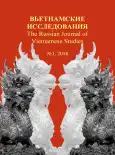Роль управления бизнесом в формировании экономики совместного потребления
- Авторы: Тхань Х.Л.1, Кхань Т.Ф.1
-
Учреждения:
- Дипломатическая академия Вьетнама
- Выпуск: Том 2, № 1 (2018)
- Страницы: 52-68
- Раздел: Статьи
- URL: https://journal-vniispk.ru/2618-9453/article/view/84212
- ID: 84212
Цитировать
Аннотация
Полный текст
Открыть статью на сайте журналаОб авторах
Ха Лам Тхань
Дипломатическая академия Вьетнама
Email: lamthanhha@dav.edu.vn
старший лектор факультета мировой экономики Дипломатической академии Вьетнама
Ти Фунг Кхань
Дипломатическая академия Вьетнамавыпускник бакалавриата факультета мировой экономики Дипломатической академии Вьетнама
Список литературы
- Botsman, R. (2015). Defining the Sharing Economy: What is Collaborative consumption-and What isn’t? Retrieved on September 30, 2017 from http://www.fastcoexist.com/3046119/defining-the-sharing-economywhat-is-collaborative-consumption-and-what-isnt.
- Brown, G. E. (2016). An Uberdilemma: Employees and independent contractors in the sharing economy. Retrieved on September 30, 2017 from http://digitalcommons.law.umaryland.edu/cgi/viewcontent.cgi?article=1042&context=endnotes.
- Codagnone, C. & Martens, B. (2016). Scoping the Sharing Economy: Origins, Definitions, impact and Regulatory Issues. JRC Science for Policy Report. Luxembourg: Publications Office of the European Union.
- Hamari, J., Sjoklint, M. & Ukkonen, A. (2016). The Sharing Economy: Why People Participate in Collaborative Consumption. Journal of the Association for Information Science and Technology, 67(9), 2047-2059. Retrieved on September 30, 2017 from https://www.researchgate.net/publication/255698095_The_Sharing_Economy_Why_People_Participate_in_Collaborative_Consumption.
- Hom, E. J. (2013). What is C2C? Retrieved on September 30, 2017 from http://www.businessnewsdaily.com/5084-what-is-c2c.html.
- Jericho, G. (2016). The dark side of Uber: why the sharing economy needs tougher rules. Retrieved on September 30th, 2017 from https://www.theguardian.com/business/grogonomics/2016/apr/18/uberairbnb-sharing-economy-tougher-rules-australia.
- Milne, A. & Parboteeah, P. (2016). The business models and economics of peer-to-peer lending. Retrieved on September 30, 2017 from https://www.ceps.eu/system/files/ECRI%20RR17%20P2P%20Lending.pdf. 8
- Newlands, M. (2016). The sharing economy: Why it works and how to join. Retrieved on September 30, 2017 from https://www.forbes.com/sites/mnewlands/2015/07/17/the-sharing-economy-why-it-works-and-how-to-join/#43a98afa58e1.
- Petropoulos, G. (2017). An economic review of the collaborative economy. Retrieved on September 30, 2017 from http://bruegel.org/wp-content/uploads/2017/02/PC-05-2017.pdf.
- Pricewaterhouse Coopers (2016). Europe’s five key sharing economy sectors could deliver €570 billion by 2025. Retrieved on September 30th, 2017 from http://press.pwc.com/News-releases/urope-s-five-key-sharing-economy-sectors-could-deliver-570-billion-by-2025/s/45858e92-e1a7-4466-a011-a7f6b9bb488f.
- Schlaf (2014). Uberification of the US Service Economy. Retrieved on September 30, 2017 from https://schlaf.me/2014/04/04/uberification-of-the-us-service-economy/.
- Stark, H. (2016). The science behind Uberification: How Uber changed the world. Retrieved on September 30, 2017 from http://www.huffingtonpost.com/harold-stark/the-science-behind-uberif_b_12376016.html.
- Taeihagh, A. (2017). Crowdsourcing, Sharing Economies, and Development. Journal of Developing Societies, 33(2), 191-222. Retrieved on September 30, 2017 from https://arxiv.org/ftp/arxiv/papers/1707/1707.06603.pdf.
- Telles, R. (2016). Digital matching firms: A new definition in the “sharing economy” space. Retrieved on September 30, 2017 from https://www.esa.gov/sites/default/files/digital-matching-firms-new-definition-sharing-economy-space.pdf.
- Teubner, T. (2014). Thoughts on the sharing economy. Retrieved on September 30, 2017, from http://www.timmteubner.de/graphics/sharing_ec.pdf.
Дополнительные файлы







